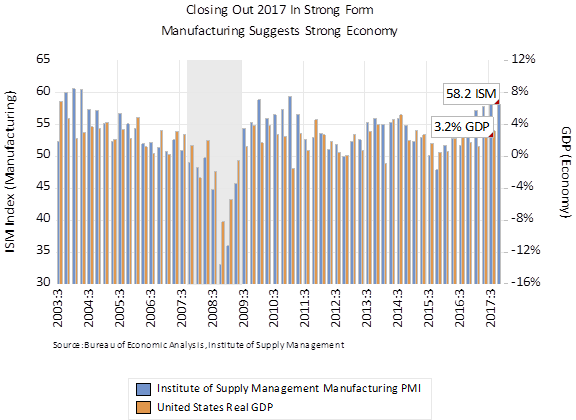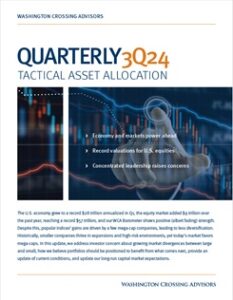Monday Morning Minute 010218
MACROECONOMIC INSIGHT
We begin 2018 on a positive note. Last week’s Chicago PMI posted its third straight plus 60 score and is on the best streak for the index in over three years. We expect similar positive results this week from the various manufacturing reports released.
The theme of these reports is positive economic growth. After hovering around 2% for 2016 and into last year, GDP has topped 3% each of the last two quarters. We expect that this week’s data on manufacturing will point to an economy still enjoying a cyclical upswing. Macroeconomic Advisers and the Atlanta Fed’s GDPNow model expects 2.4% and 2.8% fourth quarter real GDP growth, respectively. Given our expectation for continued strong momentum through December, we could easily envision an even higher growth rate for the quarter when all is said and done.
Best wishes for a happy, healthy, and prosperous 2018!
ECONOMIC DATA THIS WEEK
| Date | Report | Period | Survey | Prior |
| Monday, Jan 1: | New Year’s Day: Markets Closed | |||
| Tuesday, Jan 2: | PMI Manufacturing Index | Dec | 55 | 55 |
| Wednesday, Jan 3: | FOMC Meeting Minutes | |||
| ISM Manufacturing Index | Dec | 58.2 | 58.2 | |
| Construction Spending M/M | Nov | 0.7% | 1.4% | |
| Total Vehicle Sales | Dec | 17.50M | 17.35M | |
| Domestic Vehicle Sales | Dec | 13.25M | 13.38M | |
| Thursday, Jan 4: | Weekly Jobless Claims | 12/30 | — | 245K |
| ADP Employment Report | Dec | 190K | 190K | |
| Friday, Jan 5: | Change in Nonfarm Payrolls | Dec | 188K | 228K |
| Unemployment Rate | Dec | 4.1% | 4.1% | |
| Labor Force Participation Rate | Dec | — | 62.7% | |
| Underemployment Rate | Dec | — | 8.0% | |
| Average Weekly Hours all Employees | Dec | 34.5 | 34.5 | |
| Average Hourly Earnings M/M | Dec | 0.3% | 0.2% | |
| Average Hourly Earnings Y/Y | Dec | 2.5% | 2.5% | |
| International Trade Balance | Nov | -$47.8B | -$48.7B | |
| Factory Orders | Nov | 1.4% | -0.1% | |
| Factory Orders Ex Transportation | Nov | — | 0.8% | |
| ISM Non-Manufacturing Index | Dec | 57.6 | 57.4 | |
| Source: Bloomberg |
ASSET ALLOCATION PORTFOLIO POSTURE
Based on shorter-term expectations, the “tactical” allocation within portfolios is overweight stocks versus bonds.
Kevin Caron, CFA, Senior Portfolio Manager
Chad Morganlander, Senior Portfolio Manager
Matthew Battipaglia, Portfolio Manager
Suzanne Ashley, Analyst
(973) 549-4052
www.washingtoncrossingadvisors.com
www.stifel.com
_______________________________________________________________________________________________________________________________________
Disclosures
WCA Fundamental Conditions Barometer Description: We regularly assess changes in fundamental conditions to help guide near-term asset allocation decisions. The analysis incorporates approximately 30 forward-looking indicators in categories ranging from Credit and Capital Markets to U.S. Economic Conditions and Foreign Conditions. From each category of data, we create three diffusion-style sub-indices that measure the trends in the underlying data. Sustained improvement that is spread across a wide variety of observations will produce index readings above 50 (potentially favoring stocks), while readings below 50 would indicate potential deterioration (potentially favoring bonds). The WCA Fundamental Conditions Index combines the three underlying categories into a single summary measure. This measure can be thought of as a “barometer” for changes in fundamental conditions.
The information contained herein has been prepared from sources believed to be reliable but is not guaranteed by us and is not a complete summary or statement of all available data, nor is it considered an offer to buy or sell any securities referred to herein. Opinions expressed are subject to change without notice and do not take into account the particular investment objectives, financial situation, or needs of individual investors. There is no guarantee that the figures or opinions forecasted in this report will be realized or achieved. Employees of Stifel, Nicolaus & Company, Incorporated or its affiliates may, at times, release written or oral commentary, technical analysis, or trading strategies that differ from the opinions expressed within. Past performance is no guarantee of future results. Indices are unmanaged, and you cannot invest directly in an index.
Asset allocation and diversification do not ensure a profit and may not protect against loss. There are special considerations associated with international investing, including the risk of currency fluctuations and political and economic events. Investing in emerging markets may involve greater risk and volatility than investing in more developed countries. Due to their narrow focus, sector-based investments typically exhibit greater volatility. Small company stocks are typically more volatile and carry additional risks, since smaller companies generally are not as well established as larger companies. Property values can fall due to environmental, economic, or other reasons, and changes in interest rates can negatively impact the performance of real estate companies. When investing in bonds, it is important to note that as interest rates rise, bond prices will fall. High-yield bonds have greater credit risk than higher-quality bonds. The risk of loss in trading commodities and futures can be substantial. You should therefore carefully consider whether such trading is suitable for you in light of your financial condition. The high degree of leverage that is often obtainable in commodity trading can work against you as well as for you. The use of leverage can lead to large losses as well as gains.
All investments involve risk, including loss of principal, and there is no guarantee that investment objectives will be met. It is important to review your investment objectives, risk tolerance and liquidity needs before choosing an investment style or manager. Equity investments are subject generally to market, market sector, market liquidity, issuer, and investment style risks, among other factors to varying degrees. Fixed Income investments are subject to market, market liquidity, issuer, investment style, interest rate, credit quality, and call risks, among other factors to varying degrees.
This commentary often expresses opinions about the direction of market, investment sector and other trends. The opinions should not be considered predictions of future results. The information contained in this report is based on sources believed to be reliable, but is not guaranteed and not necessarily complete.
The securities discussed in this material were selected due to recent changes in the strategies. This selection criteria is not based on any measurement of performance of the underlying security.
Washington Crossing Advisors LLC is a wholly owned subsidiary and affiliated SEC Registered Investment Adviser of Stifel Financial Corp (NYSE: SF).




